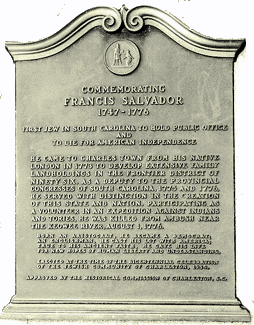 Plaque by Historical Comission of Charleston, S.C. | |
| | |
Thursday, 1 July 2010
Francis Salvador: Martyr of the American Revolution
By Michael Feldberg
http://www.JewishWorldReview.com | When we think of Jewish heroes of the American Revolution, Haym Salomon, the "financier" of the patriot cause or Isaac Franks, aide-de-camp to General George Washington, are the first names that come to mind. Rarely do we hear of South Carolina's Francis Salvador, the first identified Jew to be elected to an American colonial legislature, the only Jew to serve in a revolutionary colonial congress and the first Jew to die for the cause of American liberty.
Francis Salvador was born in London in 1747, the fourth generation of Salvadors to live in England. His great grandfather Joseph, a merchant, established himself as a leader of England's Sephardic community and became the first Jewish director of the East India Company. When George III ascended the British throne, Joseph Salvador arranged an audience for the seven-man delegation that officially congratulated the king on behalf of the Jewish community.
Even before Francis Salvador's birth, his family developed interests in America. Salvador's grandfather teamed with two other leaders of the London Jewish community to raise funds to send some of London's destitute Jews to the new British colony in Savannah, Georgia. The Georgia trustees subsequently voted to ban Jewish immigration to Georgia but not before grandfather Salvador and his two associates had landed forty-two Jewish settlers in Savannah in July, 1733. When the founder of the colony, James Oglethorpe, intervened on behalf of the Jews, the trustees decided to let them stay. The Salvador family then purchased personal land holdings in South Carolina.
As a young man, Francis Salvador was raised in luxury in London. He was well educated by private tutors and traveled extensively. At age twenty, he married his first cousin, Sarah, and took his place in the family shipping firm. The devastating effects of a 1755 earthquake in Lisbon, where the family had extensive interests, weakened the family fortune. The failure of the East India Company completed its ruin. By the early 1770's, virtually the only thing left of the Salvador family's immense wealth was the large plot of land they had purchased in the South Carolina colony.
In 1773, in an attempt to rebuild the family fortune, Francis Salvador moved to South Carolina. Intending to send for his wife Sarah and their children when he had prepared a proper home for them, Salvador arrived in Charleston in December and established himself as a planter on a seven thousand acre tract he acquired from his uncle. Salvador found himself drawn to the growing American movement against British rule and unhesitatingly threw himself into the patriot cause. Within a year of his arrival, at the age of 27, Salvador was elected to the General Assembly of South Carolina. He became the first Jew to hold that high an elective office in the English colonies. He would hold the post until his sudden death.
In 1774, Francis Salvador was elected as a delegate to South Carolina's revolutionary Provincial Congress, which assembled in Charleston in January 1775. The Provincial Congress framed a bill of rights and prepared an address to the royal governor of South Carolina setting forth the colonists' grievances against the British crown. Salvador played an important role in the South Carolina Provincial Congress, which appointed him to a commission to negotiate with Tories living in the northern and western parts of the colony to secure their promise not to actively aid the royal government.
When the second Provincial Congress assembled in November 1775, Salvador urged that body to instruct the South Carolina delegation in Philadelphia to vote for American independence. Salvador played a leading role in the Provincial Congress, chairing its ways and means committee and serving on a select committee authorized to issue bills of credit to pay the militia. Salvador was also part of a special commission established to preserve the peace in the interior parts of South Carolina, where the English Superintendent of Indian Affairs was busily negotiating treaties with the Cherokees to induce the tribe to attack the colonists.
When the Cherokees attacked settlements along the frontier on July 1, 1776, massacring and scalping colonial inhabitants, Salvador, in an act reminiscent of Paul Revere, mounted his horse and galloped nearly thirty miles to give the alarm. He then returned to join the militia in the front lines, defending the settlements under siege. During a Cherokee attack early in the morning of August first, Salvador was shot. He fell into some bushes, where he was subsequently discovered and scalped. Salvador died forty-five minutes later. Major Andrew Williamson, the militia commander, reported of Salvador that, "When I came up to him after dislodging the enemy and speaking to him, he asked whether I had beaten the enemy. I told him 'Yes.' He said he was glad of it and shook me by the hand and bade me farewell, and said he would die in a few minutes."
His friend Henry Laurens reported that Salvador's death was "universally regretted," while William Henry Drayton, later Chief Justice of South Carolina, noted that Salvador had "sacrificed his life in the service of his adopted country." Dead at twenty-nine, never again seeing his wife or children after leaving England, Salvador was the first Jew to die waging the American Revolution. Ironically, because he was fighting on the frontier, he probably did not receive the news that the Continental Congress in Philadelphia had, as he urged, adopted the Declaration of Independence. 
Posted by
Britannia Radio
at
12:07
![]()





















